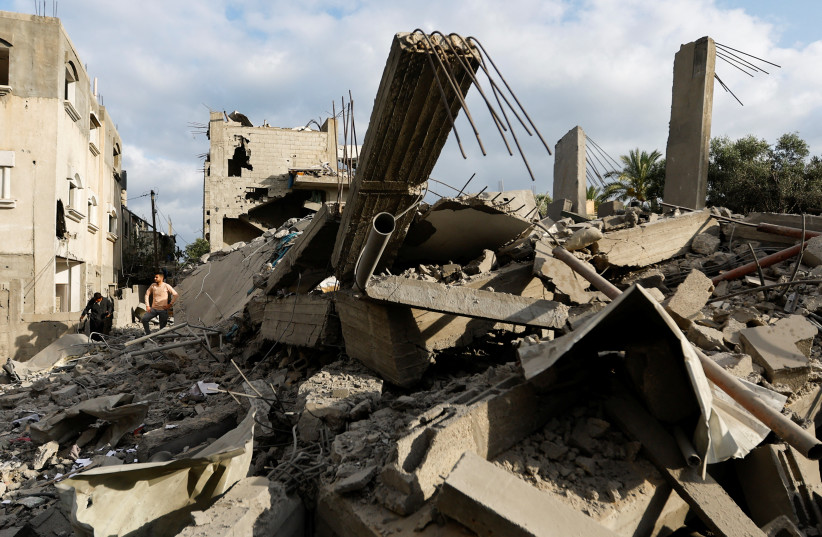How bad would a future war with Hamas be? – analysis
One of the mantras for Operation Shield and Arrow was Israel’s significant success in keeping Hamas out of the fight. But what if it joins next time?
Before we look deeper into that question, it is useful to look more carefully at the IDF’s success in keeping Hamas out of the fight this time, achieved by multiple tactical and strategic moves.
Tactical and strategic moves
First, the IDF worked overtime in its intelligence accuracy to make sure that it hit only Islamic Jihad targets and not Hamas ones. This might sound simple, as if the IDF can just look for different color uniforms, but it was a vastly complicated intelligence and tactical-operational endeavor.
 Palestinians gather at the site of an Israeli airstrike amid Israel-Gaza fighting in Deir al-Balah town in the central Gaza Strip, May 13, 2023. (credit: REUTERS/IBRAHEEM ABU MUSTAFA)
Palestinians gather at the site of an Israeli airstrike amid Israel-Gaza fighting in Deir al-Balah town in the central Gaza Strip, May 13, 2023. (credit: REUTERS/IBRAHEEM ABU MUSTAFA)The air force, the Shin Bet (Israel Security Agency) and IDF intelligence’s new AI target bank capabilities – which The Jerusalem Post recently delved into in detail – all came together in extraordinary ways to have greater pinpoint accuracy than ever before.
Strategically, the IDF decided to also ignore various actions by Hamas.
Hamas could have stopped Islamic Jihad from firing rockets and did not. Or it could have stopped Islamic Jihad from firing rockets beyond the Gaza corridor and did not.
Moreover, though Hamas participated very little in using actual military force against Israel, the IDF did imply that it had some involvement.
In addition, Hamas loudly declared its cooperative work with Islamic Jihad from a joint commander center (though IDF sources indicated that there is no such physical place and the cooperation existed only through joint posts on social media.)
Despite these actions, the IDF looked the other way. It either did not specifically identify when Hamas acted, downplayed Hamas’s role or just decided generally not to punish or attack Hamas so that the terror group would not get drawn into the fight.
What all of this means is that Hamas was actually partially involved, has not become a peace-loving group and it continues to increase its power in rockets, drones and other vectors for potentially attacking Israel.
The IDF hopes that Hamas is deterred from fighting in the future by seeing that six top Islamic Jihad officials were assassinated.
Israel didn’t want to fight Hamas
However, Hamas also saw how far Israel bent over not to anger it – sending a message that Israel is very deterred from fighting Hamas.
Another major new point the IDF said in this round which could alter any next battle with Hamas was the volume of rockets Islamic Jihad could fire. It fired zero rockets Tuesday and fewer on Saturday, such that most of its 1,400 or so rockets were fired in around a three-day period.
What if Hamas can fire 1,400 rockets or more in one day?
Previously, former senior developers of Israel’s missile defense have said that the missile shield could be substantially penetrated by Hezbollah if it fired 1,500 rockets per day.
In some scenarios, IDF officials have warned of hundreds or more deaths in a conflict with Hezbollah.
If the weaker and less sophisticated Islamic Jihad has gotten to a 1,400 rocket in three-days’ pace, might Hamas start becoming a greater, more Hezbollah-like threat? Put differently, could the pace that Hamas can fire rockets finally outpace Iron Dome and end the last 11 years of rockets largely failing to kill Israeli civilians?
For now, the IDF answer would be that Hamas is still much more of a slightly better version of Islamic Jihad than it is anything resembling the threat Hezbollah presents.
The Post has learned that the IDF may have only used around 10% of its air power against Islamic Jihad, simply because the group is that small.
In a fight with Hamas, the IDF could break out its full air power to keep down the number of rockets.
Moreover, the IDF has far more intelligence resources devoted to mapping out the far larger Hamas terror organization.
In other words, it is larger, but also more vulnerable to getting hit.
Of course, the IDF could be blindsided by its own impressive talents so that it might insufficiently appreciate Hamas’s advancing power.
No one expected Islamic Jihad to be able to fire 1,400 rockets in three days.Yet, overall it is likely that even if Hamas will surprise the IDF in some ways in any future round, the IDF’s combined attack, defense, and intelligence power will still likely overwhelm it enough to force a similar ceasefire like the one Islamic Jihad was eventually requesting from Israel. JPost





Comments are closed.